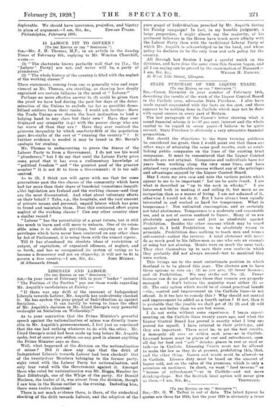IS LABOUR FIT TO GOVERN ?
[TO THE EDITOR Or THE " SPECTATOR."]
Sia,—Mr. J. H. Thomas, M.P., in an article in the Sunday Times of February 8th, replying to Mr. Winston Churchill, wrote :- (1) " The electorate knows perfectly well that we [i.e., the `Labour' Party] are not, and never will be, a party of plunderers."
(2) " The whole history of the country is filled with the neglect of the working classes."
These statements, coming from one so generally wise and expe- rienced as Mr. Thomas, are startling, as showing how deeply engrained are certain fallacies in the mind of " Labour."
Perhaps no more effective answer to (I) could be given than the proof we have had during the past few days of the deter- mination of the Unions to exclude (as far as possible) demo- bilized soldiers from their ranks. I would ask further : Have the Trade Unions ever shown the least inclination to lend a helping hand to any class but their own ? Have they ever displayed any sympathy (e.g.) with the poorer clergy who are far worse off than they are ? Have they ever realized the grievous inequality by which one-forty-fifth of the population pays five-sixths of the cost of " running the country " ? If further evidence is needed it may be found in Mr. Bevin's apologia for stealing.
Mr. Thomas is endeavouring to prove the fitness of the Labour Party to form a Government. I do not use his word " plunderers," but I do say that until the Labour Party gives some proof that it has even a rudimentary knowledge of "political freedom" and "the greatest good of the greatest number" it is not fit to form a Government: it is too self- centred.
As to (2), I think you will agree with me that for some generations past the two classes of the community which have had far more than their share of beneficial (sometimes inequit- s,ble) legislation are Ireland and the working classes--and they are the most discontented. And what about voluntary efforts on their behalf ? Take, e.g., the hospitals, and the vast amount of private means and personal, unpaid labour which has gone to found and maintain them. Does this continued effort argue neglect of the working classes ? Can any other country show a similar record ?
"Labour" has the potentiality of a great future, but it still has much to learn and still more to unlearn. One of its osten- sible aims is to abolish privilege, but enjoying as it does privileges which have never been conferred on any other class by Act of Parliament, it is using them with the utmost rigour.
Till it has abandoned its obsolete ideas of restriction of output, of capitalism, of organized idleness, of neglect, and so forth, and has so reorganized its system of voting as to become a democracy and not an oligarchy, it will not be fit to


































 Previous page
Previous page